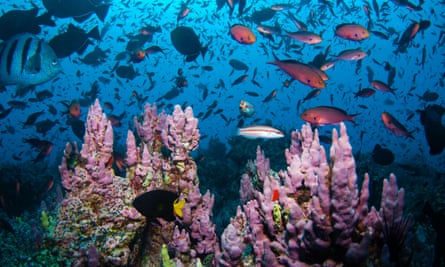When the Conservatives gather in Birmingham this weekend for their first party conference out of government in 15 years, the environment is not likely to be top of most members’ minds, amid the fever of a leadership campaign.
That is probably a good thing, many green-tinged Tory insiders feel. The leadership campaign is dominated by the right wing of the party, with the favourite, Robert Jenrick, slugging it out on issues such as immigration, Brexit and the “scourge of woke” with Kemi Badenoch, James Cleverly and Tom Tugendhat.
One former senior green Tory privately warns the campaign is “likely to be a race to the bottom – the candidates appear to have spent most of their time trying to out-populist each other”.
But as the party prepares for the slog of opposition, and begins to draw up a platform of policies for the next five years under a new leader, the realities of the climate crisis, the net zero target, and the dire state of the UK’s environment – including sewage-filled rivers, a touchstone issue in the general election – cannot be avoided for long.
“Conservatives in government presided over some significant environmental achievements, such as the near elimination of coal from our energy mix and the creation of the blue belt of marine reserves around our overseas territories,” says Sam Hall, the director of the Conservative Environment Network (CEN). “But the party underplayed and undermined this record during the election campaign. To rebuild, the party must learn the lessons from the defeat, re-establish a positive environmental narrative, and put concern for the environment at the heart of its agenda in opposition. That means holding the new government to account on its environmental delivery, challenging its overly statist approach, and setting out a distinctively conservative platform on climate change and nature loss.”

Polling from More in Common in the general election suggests most voters are in favour of net zero and action on the environment. Using net zero as a “culture war” issue appeared to backfire, or at least had no positive impact for Rishi Sunak. Labour won while championing decarbonisation as one of its five “missions” for government; the Liberal Democrats made a strong showing with a green agenda including a strong focus on rivers; and the Green party enjoyed its best ever result, with four MPs.
Meanwhile, Reform UK, which also now has four MPs including Nigel Farage, made clear at its recent conference that opposing net zero would join Brexit and immigration as its three core issues.
That leaves the Conservatives facing a choice: to turn rightwards and emulate Reform and the Republicans in the US; or to embrace the longstanding tradition of green Toryism, exemplified by David Cameron in his successful campaign to be leader a political generation ago, and carried on by Theresa May, Boris Johnson and many senior cabinet figures of the last 14 years.
Ben Goldsmith, a financier and the chair of CEN, says the only route to government is the green path. “It’s vital that as the party rebuilds from the general election defeat it reconnects with the core conservative instinct to protect and restore nature,” he says. The party’s achievements – including starting the reform of agricultural subsidies – were downplayed in the election, he feels.
“They should have been much more vocal in the election about these achievements, and they should lay claim to this legacy now in opposition. Public concern about nature has been rising steeply in recent years. This is a political opportunity as well as moral responsibility we have for future generation,” he says.
Developing a coherent economic programme also requires addressing the climate, adds Ryan Shorthouse, the executive chair of the Bright Blue thinktank, as pursuing net zero would lead to “new commercial opportunities to deliver economic growth”.
Craig Bennett, the chief executive of the Wildlife Trusts, says there is huge mileage in courting voters on green issues: “The UK is a country of nature lovers, with membership of environmental organisations still growing and already far exceeding that of political parties. If the Conservatives want to be forward looking and relevant to the concerns of large sections of the electorate, especially younger voters, they need to wake up and smell the organic coffee, and develop a comprehensive set of policies to tackle the climate and nature crises. Only then might they become an electoral option for these key voter segments.”

A cross-party approach would also impress voters more than populism, believes Mike Childs, the head of policy at Friends of the Earth. “Protecting the planet and the people on it should be an area of agreement and priority across all serious political parties and not an issue of culture wars and playground politics.”
As the Conservatives seek ways to reconnect with the electorate, and differentiate themselves from Labour, an unlikely political partnership beckons. The Green party and the Tories have generally had little in common, but on pylons they have found a common enemy.
To achieve its aim of decarbonising electricity by 2030, Labour needs to build hundreds of miles of pylons across the countryside, to deliver power from offshore and onshore windfarms to the urban areas where it is needed. Local groups are gearing up to protest in affected areas.
The Tory MP Graham Stuart, a former climate minister, told a recent CEN gathering it would be “really easy” to join those protests. “The political drive for us to be the chief opponents – and while opposing quite properly not giving people a say, putting in infrastructure on a timetable that’s not realistic, or a price that’s ridiculous because it’s been forced by an artificial deadline that cannot be met – that would be legitimate.”
On the surface at least, this appears an attractive route. But as Stuart also recognises, embracing the nimby tendency could represent an electoral dead end. Blocking is easy, but it cannot replace the development of a coherent and productive policy programme. He warned: “The danger is that we actually, as a party on the environment, become the party of saying no.”
How green are the Tory leadership candidates?
The environment has not featured a huge amount in the Conservative leadership contest, but this is somewhat to the relief of green campaigners who worry it could become a race to the bottom. Some candidates, however, have more progressive ideas than others.
after newsletter promotion
Robert Jenrick
A source close to Jenrick said the 2050 target was an “ambitious goal” but that he did think the UK should aim to decarbonise. However, he has said this should “not be on the backs of working people”.
He recently told Politico that the UK did not need to be a climate leader, saying: “The UK is only 1% of the world’s emissions. There’s no prizes for being the first country in the world to decarbonise. We should be working towards net zero 2050, but we shouldn’t be decarbonising faster than our major competitors in the world.”
He will be campaigning against solar farms because he is concerned about their impact on the landscape and also about the supply chain that has been linked to human rights abuses in China.
Green score 2/5
Kemi Badenoch
A source close to Badenoch said she thought that legislating for the 2050 target without first coming up with a plan to reach that target was a big mistake, and said that as business secretary she lobbied across government to slow down the speed of net zero policy interventions.
She takes credit for the former prime minister Rishi Sunak’s decision to put back the petrol and diesel car ban to 2035 to give more time and space for industry to invest, plan and adjust, and allow more time for the charging infrastructure to be put in place. She will continue to campaign about pylons and her team said she would not be coming up with any nature policies as now was not the time to be coming up with new policies.
She believed the important thing was to establish principles and what the party was for, renew the Conservatives around a set of ideas, and then come up with policies once they had gone through that process.
Green score 1/5
Tom Tugendhat
The 2050 net zero goal could be under threat if Tugendhat ever became prime minister; in July he told Jacob Rees-Mogg’s GB News show: “No. It’s not realistic. If you can show me the science that delivers it I’ll be fascinated, because I’ve never seen it. All I’ve seen is that as an aspiration.”
He has however said that environmentalism was a core tenet of conservatism and a principle that needed to be rediscovered in the party.
When approached by the Guardian, a spokesperson for Tugendhat declined to comment or expand on his views on the environment.
Green score 2/5
James Cleverly
Cleverly’s team said he believed the country should be pushing the world to decarbonise and use it as an opportunity to boost green tech, green exports and green investment in the UK, and indicated he supported the 2050 target.
However, as leader he would take on Ed Miliband by arguing GB Energy was a “bad idea and won’t help cut bills” and that the central planning of solar panels and other renewables “will ignore local consent, which is unacceptable”. He thinks we need to decarbonise, but we should be looking to do things such as putting solar panels on top of buildings, not across prime agricultural land.
Cleverly’s team added that he would be outlining nature policies and that as minister he was proud to support the Conservative government in its Environment Act, which includes a legally binding target to halt species decline. As foreign secretary, his team said he led on the blue belt programme to promote the protection and sustainable management of marine environments.
Green score 3/5

